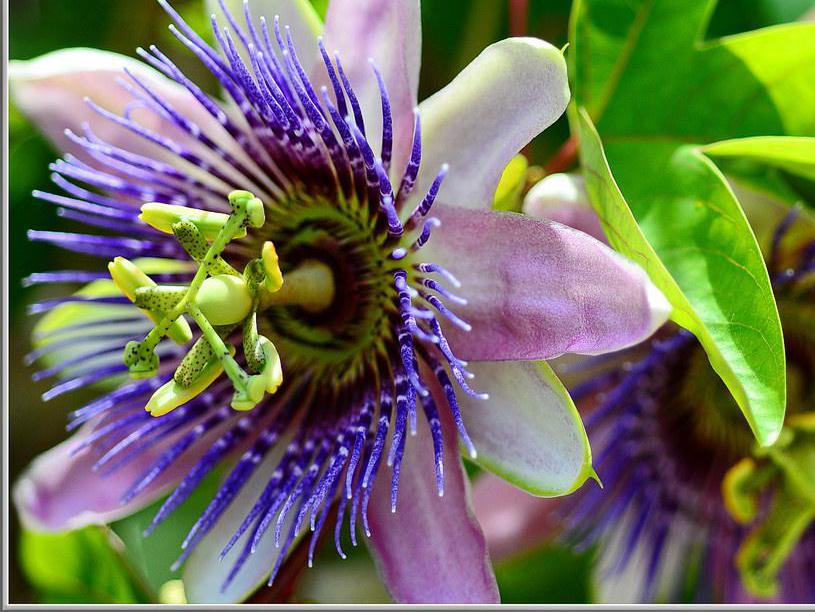At WiseGEEK, we're committed to delivering accurate, trustworthy information. Our expert-authored content is rigorously fact-checked and sourced from credible authorities. Discover how we uphold the highest standards in providing you with reliable knowledge.
What is Passion Flower Extract?
Passion flower extract is derived from the passion flower, which is also known as apricot vine or maypop. It is also known by the name passiflora incarnata. The name passion flower was given because Spanish missionaries and explorers had the opinion that the plant looked like the crown filled with thorns that Christ wore during the Passion.
As a member of the Passifloraceae family of plants, passion flower typically is found in Virginia, Tennessee, and Texas in the United States; however, the plant has been found growing in Central and South America also. Passion flower is also cultivated in Europe. Color and appearance of passion flower varies depending on the locale, the weather, and the type of soil the plant is growing in.

The medicinal part of the plant is in the aerial part, which is usually collected when the plant flowers. Passion flower extract is made through drying the passion flower and then crushing it. Liquefying the passion flower extract involves combining the crushed passion flower with liquid.
Of note, in passion flower, there are active ingredients such as flavonoids, eight-pyrone derivatives, and alkaloids. The particular mechanism through which these ingredients work has yet to be identified by traditional medical science. Passion flower extract has been shown to be a good sedative, muscle relaxer, and pain killer. It has been reported as being useful in treating various conditions related to stress or anxiety and it reportedly can be used in conditions such as hot flashes, migraine headaches, convulsions, abdominal pains, and coughing.

Granted, there are warnings pertaining to passion flower. Passion flower reportedly should not be given to children. Also, passion flower can potentially be a stimulant for the uterus which means that women who are nursing or pregnant should not use this. In addition, individuals who are taking MAO-inhibiting depressor medications should not be given passion flower. Individuals with liver disease should exercise caution since there was one reported death of liver failure when a patient took passion flower with kava.

Negative side effects such as nausea, vomiting, and rapid heart beat have reportedly occurred. There could be increased bleeding risk and there could be an affect on blood tests that assess blood clotting. Also, if taken along with caffeine products or if taken with herbs which contain caffeine, passion flower could result in increased blood pressure.

In addition, passion flower could negatively interact if one is taking herbs, supplements, or medication for anxiety, pain, seizures, bacterial infection, fungal infection, or cancer. Negative interaction with passion flower could also occur if one is taking antihistamines, antitussives, central nervous system depressants, antispasmodics, or other neurological agents. Lycopene supplements or any herbal supplements that the liver breaks down could also be dangerous when taken with passion flower.
Do not take passion flower without first talking to your physician. Also, contact your physician if you happen to experience negative symptoms. Keep in mind that although many people around the world have used passion flower without negative symptoms, each person is different. Thus, your own response to the passion flower extract should be monitored.
AS FEATURED ON:
AS FEATURED ON:














Discussion Comments
I take passion flower herb extract for sleep problems, in fact, it works a little too well. The first day I took passion flower extract, I took it in the afternoon when I was still at work and it made me fall asleep in the office!
@burcinc-- I'm glad you made that warning. It's never a good idea to use herbs without checking with a doctor. Herbs have medicinal properties, and passion flower does too. And it may interact negatively with some drugs used for anxiety and depression. Passion flower acts as a sedative, muscle relaxant, and nervous system relaxer. If it is combined with other herbs or medicines with the same properties, there can be negative interactions.
It's interesting how the passiflora plant has taken on different names in different cultures. In my country (I'm from the Middle East), it is referred to as the "clock flower" because the passiflora flower looks like a clock showing time.
I use passion flower herbal extract in an alcohol base (tincture) for anxiety. I don't take it daily, only when I really need it. It's actually a great anxiety remedy to use this way because it acts quickly. I don't have anxiety daily, but when it occurs, it's difficult to deal with. Passion flower extract helps me manage my anxiety without taking prescription drugs everyday. But I wouldn't recommend this to others, especially if they haven't asked their doctor.
I asked my doctor and he said that it's okay, particularly because my anxiety is mild. Of course, no one should quit their current anxiety medication and switch to passion flower.
Post your comments